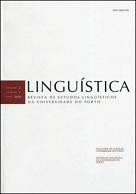From time to condition: contributions to the study of constructions with the connector "desde que" in European Portuguese
Abstract
In the first part of this paper, I analyse the syntactic and semantic properties of the constructions that involve the connective ‘desde que’ in contemporary European Portuguese. This synchronic polyfunctional connective introduces subordinate temporal and conditional clauses. It is possible to distinguish two sub-types of conditional clauses introduced by ‘desde que’, in accordance with the semantic entity type involved in its interpretation and taking into consideration the degree of integration of the subordinate in the matrix clause. The study is dominantly based on a newspaper corpus available online, CETEMPúblico (http://acdc.linguateca.pt). In the second part of the paper, and aiming to provide an integrated account of this intracategorial polysemy case, I assume the temporal reading of the connective as its basic meaning, and I argue that the process of semantic extension may be explained in terms of the conventionalizing of a conversational implicature. I support my claim on historical empirical data, collected by Fiéis & Lobo (2007).
References
Costa, J. 2008. O advérbio em Português europeu. Lisboa: Colibri.
Ferguson, C. et al. 1986. “Overview”. In E. Traugott et al. On conditionals. Cambridge: Cambridge University Press, 3-20.
Fiéis, A.; Lobo, M. 2007. “As orações introduzidas por des(de) que na história do português”. In: XXIII Encontro Nacional da Associação Portuguesa de Linguística. Textos Seleccionados. APL/Colibri, 167-178.
Hengeveld, K. 1998. “Adverbial clauses in the languages of Europe”. In: J.van der Auwera (ed.) Adverbial constructions in the languages of Europe. Berlin/New York: Mouton de Gruyter, 335-419.
Horn, L.R. 1984. “Toward a new taxonomy for pragmatic inference: Q- and R- based implicature”. In D. Schiffrin (ed.) Meaning, form, and use in context. Washington,DC: Georgetown University Press,11-42.
Kortmann, B. 1996. Adverbial subordination. A typology and history of adverbial subordinators based on European languages. Berlin/New York: Mouton de Gruyter.
Levinson, S. 2000. Presumptive meanings. Cambridge, Massachusetts: The MIT Press.
Lobo, M. 2003. Aspectos da sintaxe das orações subordinadas adverbiais do Português.Tese de Doutoramento. Universidade Nova de Lisboa.
Lopes, O. 1971. Gramática simbólica do Português. Lisboa: Instituto Gulbenkian de Ciência, Centro de Investigação Pedagógica.
Lopes, A.C.M. ; Santos, P. 1993. A condicionalidade das frases genéricas. Cadernos de Semântica, 17. Faculdade de Letras da Universidade de Lisboa.
Mateus, M. H. M et al. 2003. Gramática da Língua Portuguesa. 5ª ed., revista e aumentada. Lisboa: Caminho.
Moens, M. 1987. Tense, Aspect and Temporal Reference. PhD. Diss. University of Edinburgh.
Móia, T. 1995. Aspectos da semântica das expressões temporais com Desde e Até. Questões de Aktionsart. In: Actas do X Encontro Nacional da Associação Portuguesa de Linguística. Lisboa: APL/Colibri, 341-358.
Peres, J.; Mascarenhas, S. 2006. Notes on sentential connections (predominantly) in Portuguese. Journal of Portuguese Linguistics, 5(1): 113-169.
Peres J. et al. 1999. Sobre a forma e o sentido das construções condicionais em português. In I.H.Faria (org.) Lindley Cintra. Homenagem ao Homem, ao Mestre e ao Cidadão. Lisboa: Ed. Cosmos/FLUL, 627-653.
Traugott. E. C.; König, E. 1991. The semantics-pragmatics of grammaticalization revisited. In E. Traugott & B. Heine (eds.) Approaches to Grammaticalization. Amsterdam: John Benjamins, vol.1,189-218.
Traugott, E. C.; Dasher, R. 2008. Regularity in semantic change. Cambridge, Cambridge University Press.
Sweetser, E. 1990. From etimology to pragmatics. Metaphorical and cultural aspects of semantic structure. Cambridge: Cambridge University Press.
Vendler, Z. 1967. Linguistics in Philosophy. Ithaca, New York: Cornell University Press.
Downloads
Published
Issue
Section
License
Copyright (c) 2017 Linguística Revista de Estudos Linguísticos da Universidade do Porto

This work is licensed under a Creative Commons Attribution-NonCommercial 4.0 International License.



